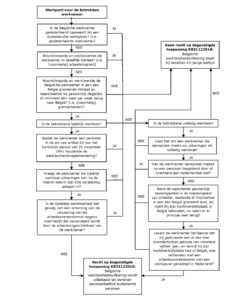The recently published Belgian Royal Decree (RD) of 12 December 2018 amending the unemployment regulations aims to provide a solution for Belgian cross-border workers facing an income gap due to the significant differences in pension ages between member states. ITEM researchers Marjon Weerepas, Sander Kramer and Hannelore Niesten explain the functioning, origin and scope of application of this RD. In addition, a decision tree has been drawn up to determine whether a mobile worker is eligible for unemployment benefits until he/she can claim a foreign pension.
Operation and origin
The Royal Decree (RD) of 12 December 2018 amending the unemployment regulations (hereinafter “Unemployment Decree”)(1) came into force retroactively on 1 January 2018 and seeks to provide a solution for frontier workers living in Belgium who were working in a country bordering Belgium. Due to the differences in pension ages between the border countries (in this case, Belgium (65 years in 2019) and the Netherlands (66 years and 4 months in 2019)), a 65-year-old border worker, who lives in Belgium, works in the Netherlands and becomes unemployed on, can receive neither Belgian unemployment benefit nor Dutch AOW.
The unemployed person will thus no longer be entitled to unemployment benefits in Belgium from the age of 65, and will only become eligible for AOW under Dutch law at a later age, resulting in an income gap. Under the new unemployment decree, the unemployed cross-border worker will, subject to conditions, continue to receive unemployment benefits in Belgium after reaching the age of 65 – paid by the Belgian National Employment Office (RVA) – until he can claim a pension granted by or under a foreign law.
Scope of application
The territorial scope of the RD covers workers employed in a country bordering Belgium, i.e. the Netherlands, Germany, France, Luxembourg and the UK. The frontier worker must have “in principle returned to the place of residence in Belgium every day”.
The following cumulative conditions apply to a temporary unemployed person:
- The worker does not enjoy a pension within the meaning of Article 65 of the Royal Decree of 25 November 1991 on unemployment regulations (Article 65 provides that the unemployed person who can claim a full pension cannot enjoy benefits);
- The worker applies for benefits as temporarily unemployed after the month in which his 65th birthday is situated;(2)
- Temporary unemployment is not the result of a suspension of performance of the employment contract due to force majeure caused by the worker’s disability.
For the fully unemployed, the following cumulative conditions apply:
- It is an employee who claims benefits as a fully unemployed person (as a full-time or voluntarily part-time employee); The part-time employee who receives income guarantee benefits or for the employee who would claim benefits as a temporarily unemployed person due to medical force majeure is excluded.
- The worker cannot claim a pension granted by or under a foreign law; It is not sufficient not to receive a foreign pension. The employee may also not be entitled to a foreign pension (i.e. as regards the first pension pillar in the country of employment). As regards a possible second pension pillar, it should be considered in each case in the relevant country whether this should be considered a pension(3). In the Netherlands, pension schemes under the second pension pillar consisting of collective occupational pensions are regarded as pensions within the meaning of Article 65 §3 of the Royal Decree of 25/11/1991.(4) For pragmatic reasons, it is accepted that this condition is met if the employee does not receive the compensation. If the pensions have been accrued in Belgium (e.g. as a result of a mixed professional career), a cumulation rule applies.(5) The worker will not be able to take e.g. an incomplete retirement pension to enjoy together with unemployment benefits. However, if the cross-border worker is already receiving benefits from a Dutch second pillar pension, this would prevent a benefit under the RD. However, if he can provide proof, based on an attestation from the competent pension institution, that the pension was effectively and fully reimbursed for the period in question, he can still claim unemployment benefits under the RD retroactively.
- The worker was usually employed in the capacity of a labourer, clerk or miner in a country bordering Belgium, and has maintained his main residence in Belgium, returning to it in principle on a daily basis;
- The employee provides proof that, for a period, continuous or otherwise, of at least 15 years, and while having his main residence in Belgium, he was linked to an employment contract with an employer established in a country bordering Belgium (i.e. the Netherlands, Germany, France, Luxembourg and the United Kingdom). The requirement of being linked to an employment contract with an employer for 15 years remains fulfilled, even in case of periods of possible illness, temporary unemployment, leave without pay. A purely fictitious employment contract is admittedly excluded from the benefit scheme.
- The employee is subject to the application of Regulation (EC) No 883/2004. As a result of the Brexit, the condition that the frontier worker must be covered by Regulation (EC) 883/2004/EC may no longer be met when employed in the UK.
Analysis
The ITEM researchers also analysed with the case law of the Court of Justice EU. They also conclude that more still needs to be done to ensure equal treatment for mobile workers. These can be found in the publication in the Journal of Cross-border Working 2019 (no 21), available in the appendix.
Decision tree
Is the Belgian cross-border worker entitled to unemployment benefits while waiting for his Dutch pension?
This decision tree, prepared by the researchers, makes it clear.


